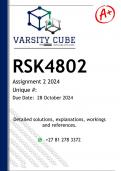RSK4802
Assignment 2 2024
Unique #:
Due Date: 28 October 2024
Detailed solutions, explanations, workings
and references.
+27 81 278 3372
, INTRODUCTION
The Financial Advisory and Intermediary Services Act (FAIS Act) in South Africa
governs the regulation and operation of financial services providers (FSPs) and
intermediaries. One of the pivotal positions highlighted by the FAIS Act is the
Compliance Officer, who plays a critical role in ensuring that FSPs adhere to the
legal and regulatory frameworks of the financial services industry. The Act stresses
that a Compliance Officer must meet the criteria of being “fit and proper” to
effectively fulfill their responsibilities. Section 8 of the FAIS Act outlines the key
requirements that a Compliance Officer must satisfy to be considered fit and
proper, which include aspects related to integrity, competence, operational ability,
financial soundness, and adherence to the requirements of honesty.
The importance of these fit and proper requirements in the context of risk
management cannot be overstated, as they help mitigate various operational and
compliance risks within the financial services sector. This discussion elaborates on
the five fit and proper requirements outlined in Section 8 of the FAIS Act and their
significance in ensuring effective risk management within an FSP.
PERSONAL CHARACTER QUALITIES OF HONESTY AND INTEGRITY
Section 8(1)(a) of the FAIS Act states that an applicant, including the Compliance
Officer, must demonstrate personal character qualities of honesty and integrity.
This requirement ensures that the individuals involved in the management and
compliance functions of an FSP are trustworthy and act in an ethical manner.
Compliance Officers are often entrusted with sensitive information, including client
data, and are responsible for ensuring that the FSP complies with complex
regulations and avoids legal violations. Therefore, honesty and integrity are
foundational traits to ensure that compliance practices are followed without
compromise.
In the context of risk management, having a Compliance Officer who demonstrates
honesty and integrity reduces the likelihood of fraudulent or unethical practices
within the organization. Fraud, corruption, or unethical behavior poses significant
risks to FSPs, potentially resulting in financial losses, reputational damage, and
Varsity Cube 2024 +27 81 278 3372




